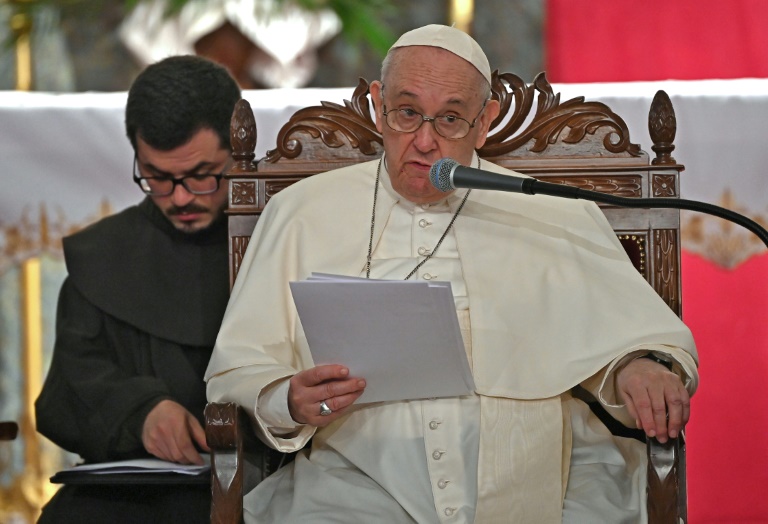Pope Francis on Thursday called for unity as Europe deals with the arrival of refugees and migrants, speaking on the divided Mediterranean island of Cyprus, a major destination for people fleeing war and poverty.
“We need to welcome and integrate one another, and to walk together as brothers and sisters, all of us,” said the pontiff, 84, at the start of a five-day trip that from Saturday takes him on to Greece.
Speaking in a Maronite church in the Cypriot capital Nicosia, the pope said “the presence of many of our migrant brothers and sisters” had made Cyprus “a true point of encounter between different ethnicities and cultures”.
The island’s experience served as a reminder to Europe that “we need to work together to build a future worthy of humanity, to overcome divisions, to break down walls, to dream and work for unity,” he said.
Speaking of religious diversity in Cyprus, he said: “We should not experience diversity as a threat to identity. We should not be jealous or defensive”.
Francis — on his 35th international trip since becoming pope in 2013 — is the second Catholic pontiff to set foot on Cyprus after Benedict XVI visited in 2010.
The country of one million has a Catholic minority of about 25,000, among them Maronites whose ancestors arrived from Syria and Lebanon, and overseas workers from the Philippines, South Asia and African countries.
“We’re such a small minority so it’s great to feel that you belong to a greater family, the Catholic family,” said Eliana Maltezou, 38, holding her one-year-old son Pavlo, and waving a small Cypriot flag.
– ‘Vulnerable and marginalised’ –
Cyprus has been divided since 1974 when Turkish forces invaded and occupied the island’s northern third in response to a coup sponsored by the Greek junta in power at the time.
Only Ankara recognises the self-proclaimed Turkish Republic of Northern Cyprus and tensions simmer between the two sides.
The division saw about 200,000 people, including many Maronites from the north, displaced from their homes.
Maronite Monica Despoti, 55, whose village Asomatos remains in the occupied north, said the pope’s visit meant “we’re very, very happy and we also have a hope that with his help we can go back to our motherland.
“We want so badly to go back to our villages to live there and for us it is a hope that we are having the pope here with us.”
The majority-Greek speaking south accuses the north of sending migrants across the UN-patrolled Green Line and also says that it receives the highest number of first-time asylum seekers of any EU member country.
The pope has long called for better protection for migrants. In a video message ahead of the trip, Francis described the Mediterranean as a “huge cemetery” for migrants who drowned.
“We know that Pope Francis goes above all to the most vulnerable and marginalised,” the Maronite archbishop of Cyprus, Selim Sfeir, told AFP.
Before his departure from Rome, Francis met refugees from Syria, Congo, Somalia and Afghanistan who had come via the Greek island of Lesbos and now live in Italy.
On the plane, he greeted journalists, one of whom gave him framed fabric pieces of migrant tents from the French port of Calais with the message: “To all the exiled people who died on the Franco-British border.”
“It’s terrible,” the pope replied, visibly moved.
– ‘Unity and peace’ –
According to Cypriot authorities, negotiations are underway with the Vatican to organise the transfer to Rome of several migrant families currently in Cyprus.
That would repeat a gesture which Francis made on Lesbos in 2016 when he returned to the Vatican with three Syrian Muslim families who had fled bombing in their homeland.
The Cyprus visit will culminate in a mass at an open-air football stadium in Nicosia on Friday, expected to draw around 7,000 people.
Before then, Francis will meet the Orthodox bishops of Cyprus at the Archbishop’s Palace in Nicosia’s Old City, following a meeting Thursday evening with President Nicos Anastasiades.
Anastasiades will propose his country’s vision for “a just and viable solution to the Cyprus problem”, his office said.
But the papal visit has stoked some tensions.
Turkish Cypriot leader Ersin Tatar accused the south of seeking to use the trip to score “political goals against Turkey and the Turkish Republic of Northern Cyprus”.
It was a “source of sorrow for us that Pope Francis will visit Greek Cyprus only,” he said.
“There are two peoples in Cyprus. Not only Christian Greeks but also Muslim Turks live in Cyprus. This is one of the basic realities of Cyprus.”
burs-lg/fz/jkb










